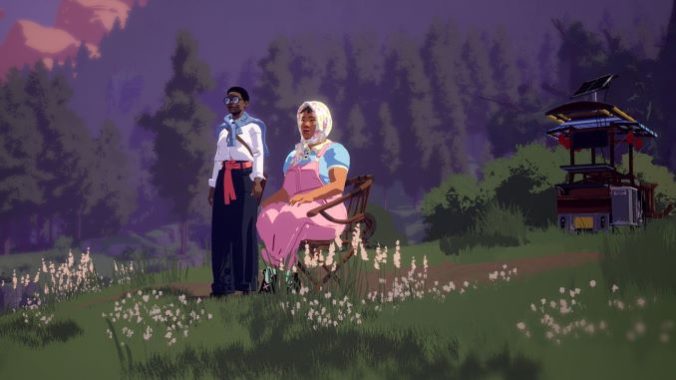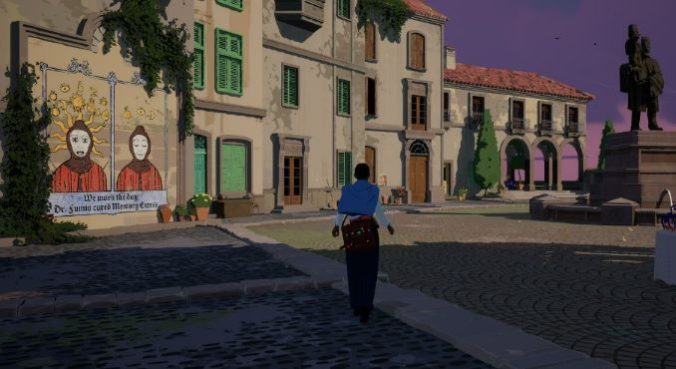
Taking your phone out to snap a photo feels almost like a reflex these days; there’s not much thought behind the action other than “that seems cool/horrible/memorable,” the kind of thing we can share on social media within seconds for reactions from our peers that happen just as quickly. There’s not the same intentionality as when you have a certain amount of film in a camera and you have to consider each shot, or you have to break out the bulky camcorder to capture a moment. I’m not necessarily advocating for us to ditch all our smartphones—being able to record the world instantaneously can be vital in many situations—but rather for us to consider the weight of these moments, rather than just quickly document them out of habit. Besides, when you consider the digital dark age and the disappearance of numerous titles from streaming services, physical media becomes all the more important.
The videogame Season: A Letter to the Future perfectly encapsulates why we need to meaningfully record the world around us. You play as Estelle, who leaves her mountain village for the first time due to her friend’s prophetic dream. Your mission is to capture the world as this season ends and the next begins by taking photographs, sketching scenery, taping sounds, and interacting with people you meet along the way. All of your cataloging has a purpose: to ensure that people remember what your time was like before things change irrevocably.
This game isn’t one for action, but rather quiet contemplation. As you pick up mementos and take pictures, you place them in your journal, eventually filling up the page enough that you unlock an “inspiration”—an observation from Estelle about whatever it is you’ve documented. Most of these remarks are genuinely thought-provoking and moving, though some can slip into fortune cookie territory. They’re really sold, though, by the soothing, compelling delivery of the voice actor behind Estelle, Maureen Adelson (in the English language version).
Visually, Season is beautiful, and it’s tempting to just stop for a moment to take in a seaside view, the impressive mountain ranges, or the strings of twinkling lights hanging in a forest. The animation finds the right balance between rendering landscapes convincingly but still cartoonishly, escaping the sometimes off-putting graphics resulting from aspirational realism. The best comparison that comes to mind is Studio Ghibli, especially regarding character design. While Estelle and some other individuals appear naturalistic, others are colorful, exaggerated, and whimsical. The result is that this world, already established as being quite different from ours, feels even more fanciful and distinct.

You’re immersed in new places as you travel on your bicycle, the haptics clearly distinguishing between whether you’re pedaling over uneven cobblestone or soft grass. I wish there was more of the world to explore, though. If you really wanted, Season could be completed in one sitting, and in some ways it feels like the game ends just as you’re starting to get into it. Of course, with a concept this serene, there’s always the risk of boredom, but games like Kentucky Route Zero have proven that rich worldbuilding and deeply existential storytelling can carry a longer play time.
Season’s most stirring messages have to do with memory, and the idea of our own histories both as something that can protect us, but also cause us pain. The game begins with the ritual creation of a pendant that’s meant to shield Estelle as she moves through the world, created by burning of meaningful objects. The catch: the moments related to these items disappear from Estelle’s mother’s memory as they’re burned.
Season establishes early on that there is something ineffably painful about forgetting that which was once important to us. However, forgetting is also framed as a way of helping people by keeping them from being burdened by past hurt. A previous season in Estelle’s world—the war season—colored people’s present, and remembering those losses made life more difficult. Ultimately, though, honoring these memories, and using them to avoid repeating mistakes, is a worthwhile endeavor. And the best way to do this, in Estelle’s case, is by keeping her journal. This paradoxical observation—that our memories are both home to past agony and the way for us to avoid future suffering—feels utterly relevant, and I imagine it will remain so.
Few games hold the distinction of both making you want to delve further into their world, while also compelling you to step outside into our own. With Season, you can get lost in the animators’ artistic work for myriad hours, but the overwhelming experience of this game will inspire you to savor our world, too.
Season: A Letter to the Future was developed and published by Scavengers Studio. Our review is based on the PlayStation 5 version. It is also available for PlayStation 4 and PC.
Clare Martin is a cemetery enthusiast and Paste’s assistant comedy editor. Go harass her on Twitter @theclaremartin.